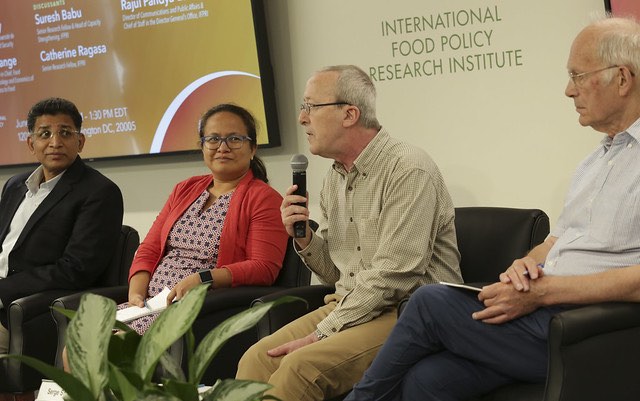When Norman Borlaug, the Nobel Peace Prize winner and father of the Green Revolution, addressed the International Society for Plant Pathology in 1998, he challenged his audience by asking: “What are you guys doing about food security?” Plant pathologists Richard Strange and Peter Scott were there, and the question moved them to found the journal Food Security: The Science, Sociology and Economics of Food Production and Access to Food.
They teamed up with Springer to publish the quarterly journal starting in 2009. It began covering a wide range of approaches to food security that other publications often overlooked.
Strange, the journal’s former editor in chief and a professor emeritus at University College London, recounted the Food Security origin story at a June 4 IFPRI special event: “The inspiration was Norman Borlaug,” he said. Event participants reviewed the journal’s first 10 years, the state of academic publishing on food security, and ideas for the future as the landscape on this key issue continues to evolve.
“At Food Security we are trying to look at production systems, natural resources, the socio-economic systems, and their interplay,” said Serge Savary, the journal’s editor in chief and Director of Research at INRA, Université de Toulouse.
Collapsing biodiversity, climate change, and global population growth are among the critical issues the journal should address going forward, Savary said. Working with multiple disciplines and finding a balance among diverse subject matter pose challenges. While the journal has devoted ample space to food production research, he noted, “we see that the physical access to food is much less addressed.” Relatively few articles engage with migration, political unrest, and individual-level access to food. There are also geographic disparities in the journal’s content, he said, with research in Africa south of the Sahara and South Asia far exceeding that from other regions.
IFPRI Senior Research Fellow and Head of Capacity Strengthening Suresh Babu underscored the importance of Food Security’s multidisciplinary approach in an increasingly siloed academic landscape. “This has been a problem for us in terms of bringing together scientists to solve problems not [only] at a broad global level, but at the local level as well,” he said.
To address the need for practical guidance in implementing local solutions, Babu proposed a “practitioner’s column,” featuring the work of scientists solving problems on the ground, which could encourage researchers and practitioners to learn from the field.
“We are increasingly understanding that food security is more than producing food,” added IFPRI Senior Research Fellow Catherine Ragasa. “It is a more fundamental issue of access to nutritious, healthy, diverse and safe food for everyone.”
Ragasa called for a more holistic view of food security and nutrition. Malnutrition comes in three forms: Undernutrition, micronutrient deficiency and overnutrition. More attention should be paid to overnutrition, i.e., obesity and overweight, she said, noting “there are more deaths from obesity and overweight than from underweight.” Ragasa suggested that more research be centered on markets, rural-to-urban demographic shifts, and gender-based constraints on food security.
Many of these gaps mirror those in the existing body of research, Savary said. To help fill them, Babu and Ragasa proposed the journal establish and promote clear parameters for papers to encourage researchers to produce high-quality interdisciplinary work. “I see this as an opportunity for Food Security to be a leader and trend-setter,” said Ragasa. Unlike some mainstream single-discipline journals, panelists agreed, Food Security’s multidisciplinary approach gives it the potential to change practices on the ground.
Asked about whether being a subscription-only publication might limit such impacts, Springer representative Melinda Paul said the publisher is expanding initiatives in which paid content—including Food Security—is distributed free-of-charge.
Savary concluded by emphasizing the journal’s focus on influencing the varied and overlapping approaches to research and writing on food security. “What we do is invest,” he said. Investing in promising young authors from developing countries is a top priority, he said, more so than traditional markers of journal success including star ratings and the short-term impact factor. As Food Security begins its second decade, Savary said, it will continue cultivating new authors and areas of inquiry.
Isabella Di Pietro is an IFPRI Communications Intern.







